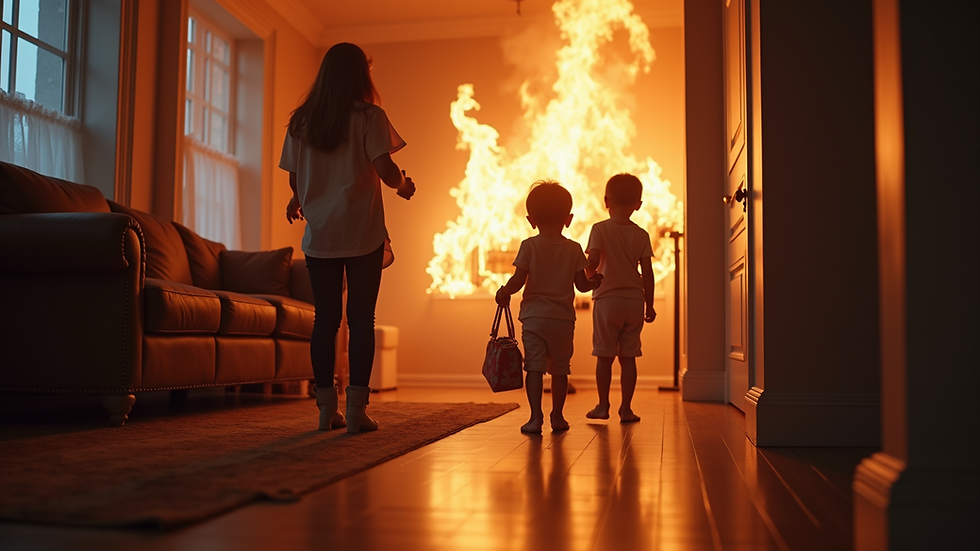Fire Safety Tips for Families in Yukon, OK
- courtney92892
- Aug 12, 2025
- 4 min read
Fire safety is a crucial topic for families everywhere, but it takes on a special significance in places like Yukon, OK. With the changing seasons and the potential for wildfires, it is essential to be prepared. This blog post will provide practical fire safety tips that every family should know.
Fire safety is not just about having a fire extinguisher on hand. It involves understanding risks, creating plans, and practicing safety measures. Let’s dive into some essential tips that can help keep your family safe.
Understand Fire Risks in Your Area
Yukon, OK, has its unique fire risks. Understanding these risks is the first step in fire safety.
Wildfires: During dry seasons, wildfires can pose a significant threat. Be aware of local fire bans and restrictions.
House Fires: Cooking is one of the leading causes of house fires. Always stay in the kitchen while cooking and keep flammable items away from heat sources.
Heating Equipment: Space heaters and fireplaces can also be fire hazards. Ensure they are used correctly and maintained regularly.
By understanding these risks, you can take proactive steps to mitigate them.
Create a Fire Escape Plan
Every family should have a fire escape plan. This plan should be clear and practiced regularly.
Identify Exits: Know all possible exits in your home. This includes doors and windows.
Designate a Meeting Spot: Choose a safe location outside where everyone will meet after escaping the house.
Practice Regularly: Conduct fire drills at least twice a year. This helps everyone remember what to do in case of an emergency.
Having a well-thought-out escape plan can save lives.
Install Smoke Alarms
Smoke alarms are essential for fire safety. They can alert you to danger before it becomes life-threatening.
Placement: Install smoke alarms on every level of your home, especially near sleeping areas.
Testing: Test your smoke alarms monthly. Replace batteries at least once a year.
Replacement: Smoke alarms should be replaced every ten years.
By ensuring your smoke alarms are functional, you increase your family's safety.
Educate Your Family
Education is a powerful tool in fire safety. Teach your family about fire risks and safety measures.
Fire Safety Basics: Explain the importance of not playing with matches or lighters.
Stop, Drop, and Roll: Teach children this technique in case their clothes catch fire.
Emergency Numbers: Make sure everyone knows how to call 911 in an emergency.
The more your family knows, the better prepared they will be.
Keep Fire Extinguishers Handy
Having fire extinguishers in your home is crucial. However, knowing how to use them is just as important.
Location: Place fire extinguishers in easily accessible locations, such as the kitchen and garage.
Types: Familiarize yourself with different types of extinguishers. For example, Class K extinguishers are best for kitchen fires.
Training: Consider taking a fire safety course to learn how to use a fire extinguisher effectively.
Being equipped with the right tools and knowledge can make a significant difference in an emergency.
Maintain Your Home
Regular maintenance can help prevent fires. Here are some tips to keep your home safe.
Clear Clutter: Keep hallways and exits clear of clutter. This ensures a quick escape if needed.
Check Wiring: Inspect electrical wiring for frays or damage. Hire a professional if you notice any issues.
Clean Gutters: Remove leaves and debris from gutters to prevent fires from spreading to your home.
A well-maintained home is less likely to experience a fire.
Be Cautious with Outdoor Fires
Outdoor fires can be enjoyable, but they also come with risks. Follow these guidelines to stay safe.
Fire Pits: Use fire pits safely. Keep them at least 10 feet away from structures and flammable materials.
Supervision: Never leave outdoor fires unattended. Always have a bucket of water or a hose nearby.
Burn Bans: Be aware of local burn bans, especially during dry seasons.
Taking precautions with outdoor fires can prevent accidents.
Know What to Do in Case of a Fire
In the event of a fire, knowing what to do can save lives.
Stay Calm: Panic can lead to poor decisions. Stay as calm as possible.
Get Low: If there is smoke, get low to the ground to avoid inhalation.
Use Exits: Use the nearest exit to escape. If a door is hot, do not open it. Find another way out.
Practicing these steps can help everyone respond effectively in an emergency.
Involve the Whole Family
Fire safety is a family affair. Involve everyone in the process.
Assign Roles: Assign specific roles to family members during fire drills. This can help everyone know what to do.
Discuss Safety: Have regular discussions about fire safety. This keeps the topic fresh in everyone’s mind.
Celebrate Safety: Reward your family for participating in fire safety activities. This can make learning fun.
When everyone is involved, fire safety becomes a shared responsibility.
Stay Informed
Stay updated on fire safety information.
Local Resources: Check with local fire departments for resources and programs.
Community Events: Participate in community fire safety events. These can provide valuable information and training.
Online Resources: Use reputable websites for fire safety tips and guidelines.
Being informed can help you stay prepared.
Conclusion: A Safer Tomorrow Starts Today
Fire safety is not just a one-time effort; it is an ongoing commitment. By understanding risks, creating plans, and educating your family, you can significantly reduce the chances of a fire affecting your home.
Remember, safety starts with you. Take these tips to heart and make fire safety a priority in your family. Together, you can create a safer environment for everyone.




Comments